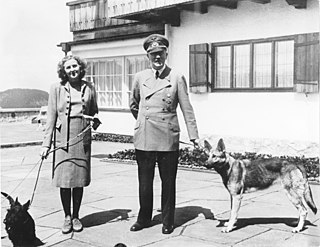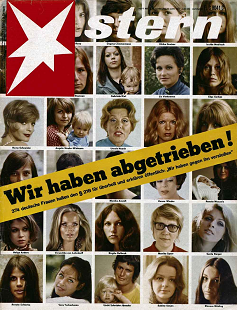
Senta Verhoeven is an Austrian-German actress. She received many award nominations for her acting in theatre, film and television; her awards include three Bambi Awards, two Romys, an Adolf Grimme Award, both a Deutscher and a Bayerischer Fernsehpreis, and a Goldene Kamera.
Das Erste is the flagship national television channel of the ARD association of public broadcasting corporations in Germany. Das Erste is jointly operated by the nine regional public broadcasting corporations that are members of the ARD.

Alice Sophie Schwarzer is a German journalist and prominent feminist. She is founder and publisher of the German feminist journal EMMA. Beginning in France, she became a forerunner of feminist positions against anti-abortion laws, for economic self-sufficiency for women, against pornography, prostitution, female genital mutilation, and for a fair position of women in Islam. She authored many books, including biographies of Romy Schneider, Marion Dönhoff and herself.

Emine Sevgi Özdamar is a writer, director, and actress of Turkish origin who resides in Germany and has resided there for many years. Özdamar's art is distinctive in that it is influenced by her life experiences, which straddle the countries of Germany and Turkey throughout times of turmoil in both. One of her most notable accomplishments is winning the 1991 Ingeborg Bachmann Prize.

The sexuality of Adolf Hitler, dictator of Germany from 1933 to 1945, has long been a matter of historical and scholarly debate, as well as speculation and rumour. There is evidence that he had relationships with a number of women during his lifetime, as well as evidence of his antipathy to homosexuality, and no evidence of homosexual encounters. His name has been linked to a number of possible female lovers, two of whom committed suicide. A third died of complications eight years after a suicide attempt, and a fourth also attempted suicide.
Bayerischer Fernsehpreis is an award presented by the government of Bavaria, Germany since 1989. The prize symbol is the "Blue Panther", a figure from the Nymphenburg Porcelain Manufactory. The prize money is €10,000.
Heide Göttner-Abendroth is a German feminist advocating matriarchy studies, focusing on the study of matriarchal or matrilineal societies.

The Manipulated Man is a 1971 book by author Esther Vilar, originally written in German and translated to English by Eva Borneman. The main idea behind the book is that women are not oppressed by men but rather control men to their advantage. A third edition of the book was released in January 2009.

Brigitte Kronauer was a German writer who lived in Hamburg. Her novels, written in the tradition of Jean Paul with artful writing and an ironic undertone, were awarded several prizes, including in 2005 the Georg Büchner Prize, in 2011 the Jean-Paul-Preis and in 2017 the Thomas Mann Prize.
Klaus Wagn (1937–2021) was a German author and former husband of Argentine-German writer Esther Vilar. They were married for 14 years (1961–1975) and they had a son named Martin in 1963. Vilar said in 1975 they had a divorce, but claimed: "I didn't break up with the man, just with marriage as an institution." He died October 2021.

Wir haben abgetrieben! was the headline on the cover of the West German magazine Stern on 6 June 1971. 374 women, some, but not all, of whom had a high public profile, publicly stated that they had had pregnancies terminated, which at that time was illegal.

Herlinde Koelbl is a German photographic artist, author and documentary filmer.
Beate West-Leuer is a German professor, psychotherapist, consultant and coach.

Judith Stamm was a Swiss jurist and politician of the Christian Democratic People's Party (CVP). She was seen as an influential women's rights activist.

Annette Dittert is a German author, filmmaker, correspondent, and journalist.

Viola Roggenkamp is a German journalist-commentator and writer. The themes to which she most often returns are those surrounding Feminism and Judaism in Germany during and following the brutish middle years of the twentieth century. Although these topics have been much revisited by scholars and critics throughout her lifetime, several of Roggenkamp's own perspectives and conclusions are well outside the mainstream. Her output includes literary portraits, essays, opinion pieces and novels.

Sigrid Metz-Göckel is a German sociologist, political scientist and social psychologist who specializes in women's and gender studies as well as in educational research and didactics. She is a professor emerita at the Technical University of Dortmund. In the late 1970s, Metz-Göckel pioneered women's studies in Germany which became an established university course in Dortmund in 1971.

Männerschande – Frauenknechtschaft: die Prostitution vom Standpunkte der Frau: ein offenes Wort an die Männer is a book written by German author Helene Eiert. It was published in 1918 through a publishing house called "Volksheil", using the "Universitätsbuchdruckerei Styria", a university press under Styria Media Group in Graz, Austria, a press traditionally known for printing newspapers such as the Grazer Zeitung and the Volksblatt, until expanding its services to publishing books in 1886.

Inge von Bönninghausen is a German journalist and feminist. She ran the television programme Frauen-Fragen on WDR television and was a co-founder of the Journalistinnenbund in 1988. From 2000 to 2004 she was chairwoman of the German Women's Council.
Agnes-Marie Grisebach was a German actor and writer. Her real name was Agnes Eggert, but she published under her birth name.














